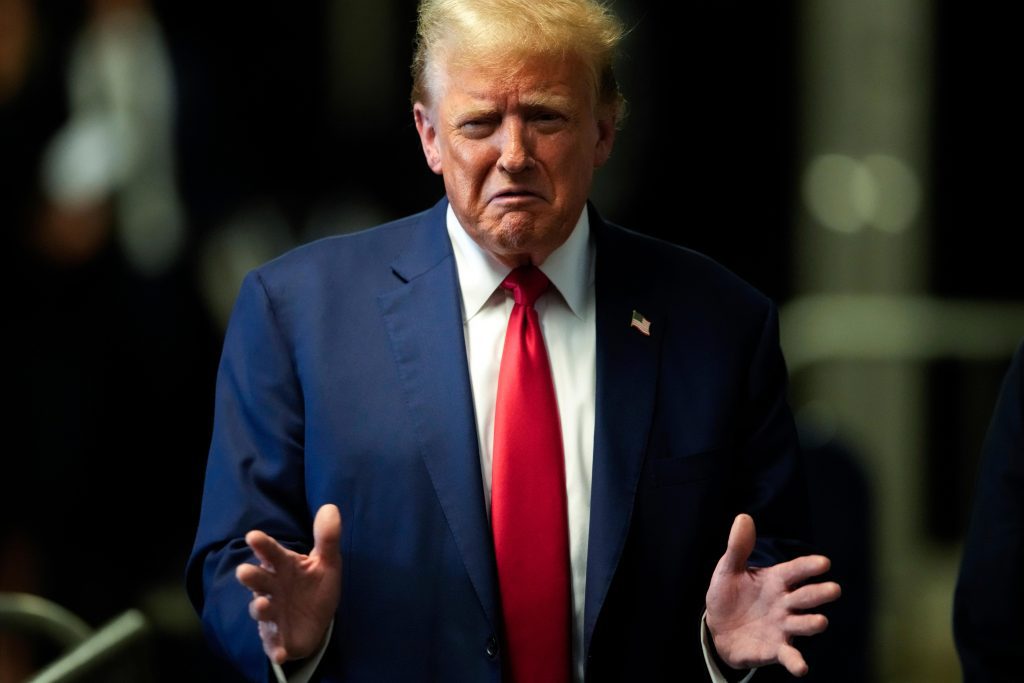By MICHAEL R. SISAK, JENNIFER PELTZ, ERIC TUCKER and JAKE OFFENHARTZ (Associated Press)
NEW YORK (AP) — Stormy Daniels appeared in court on Tuesday to testify in the trial related to secret payment of former President Donald Trump, ready to talk about a sexual encounter she had in 2006 which led to her being paid to keep silent during the presidential election 10 years later.
Daniels quickly walked into the courtroom and didn't look at Trump, who was staring straight ahead as she entered the room.
Daniels’ testimony is highly anticipated in a trial that has included tabloid-like elements and dry record-keeping details. Her testimony as an adult film performer who says she had an intimate encounter with a former American president adds to the long line of historic firsts in a case filled with claims of sex, payoffs and cover-ups.
Her testimony is crucial to the case since Trump’s then-lawyer and personal fixer, Michael Cohen, paid Daniels $130,000 to keep quiet about what she says was a surprising sexual encounter with Trump at a celebrity golf outing in Lake Tahoe in July 2006. Trump denies having sex with Daniels and has pleaded not guilty.
In the beginning of her testimony, Daniels told jurors that she met Trump because the adult film studio she worked for at the time was sponsoring one of the holes on the golf course. They discussed the adult film industry and her directing abilities when Trump’s group passed by. Trump remarked that she must be “the smart one” if she’s making films, according to Daniels.
Later, in an area known as the “gift room,” where celebrity golfers collected gift bags and swag, Trump remembered her as “the smart one” and asked her if she wanted to go to dinner, Daniels said.
Daniels stated she accepted Trump’s invitation because she wanted to avoid a planned dinner with her adult film company colleagues. She said her then-publicist suggested in a phone call that Trump’s invitation was a good excuse to skip the work dinner and would “make a great story” and perhaps help her career.
“What could possibly go wrong?” she recalled the publicist saying.
Prosecutors and defense lawyers disagreed at the start of the day about the details of her testimony.
A Trump attorney, Susan Necheles, requested that Daniels be prevented from testifying about “the details” of the alleged sexual encounter. Prosecutor Susan Hoffinger said such details were relevant to her credibility but also offered reassurances that they would be “really basic.” Judge Juan M. Merchan agreed to allow limited testimony.
It is clear from the testimony that at the time of the payment to Daniels, Trump and his campaign were struggling after the Oct. 7, 2016, publication of the unprecedented 2005 “Access Hollywood” video in which he bragged about grabbing women’s private parts without their consent.
The candidate talked to Cohen and Hope Hicks, his campaign’s press secretary, by phone the following day as they tried to minimize the impact of the recording and keep his alleged affairs from becoming public, according to testimony.
Cohen gave money to Daniels after her lawyer at the time, Keith Davidson, suggested she was willing to make public statements to the National Enquirer or on TV confirming a sexual encounter with Trump. National Enquirer editor Dylan Howard informed publisher David Pecker and then, on Pecker’s instructions, told Cohen that Daniels was pushing to go public with her claims, prosecutors said. Daniels had previously tried to sell her story to another celebrity gossip magazine, Life & Style, in 2011.
The jury on Monday heard from two witnesses, including a former Trump Organization controller, who gave a detailed but crucial account of how the company repaid payments meant to suppress embarrassing stories from emerging and then recorded them as legal expenses in a way that Manhattan prosecutors say violated the law.
The testimony from Jeffrey McConney was a key piece of evidence for prosecutors trying to reveal what they say was a corporate cover-up of transactions meant to protect Trump’s Republican presidential campaign during a critical period. It focused on a $130,000 payment from Cohen to Daniels and the subsequent reimbursement Cohen received.
McConney and another witness confirmed that the reimbursement checks came from Trump’s personal account. However, although the jurors saw the checks and other documentary evidence, prosecutors did not get testimony on Monday showing that Trump directed the payments to be recorded as legal expenses, a claim prosecutors assert was intentionally misleading.
During cross-examination, McConney admitted that Trump never told him to record the reimbursements as legal expenses or discussed the matter with him at all. Another witness, Deborah Tarasoff, a Trump Organization accounts payable supervisor, stated under questioning that she did not receive authorization to issue the checks in question from Trump himself.
“You never had any reason to believe that President Trump was hiding anything or anything like that?” Trump attorney Todd Blanche asked.
”Correct,” Tarasoff replied.
The testimony followed a stern warning from Merchan that additional violations of a gag order prohibiting Trump from making inflammatory public statements about witnesses, jurors and others closely tied to the case could lead to imprisonment.
The $1,000 penalty imposed Monday is the second time since the trial began last month that Trump has been punished for violating the gag order. He was fined $9,000 last week, $1,000 for each of nine violations.
Prosecutors are continuing to build toward their star witness, Cohen, who who admitted guilt to federal charges related to the hush money payments. He is expected to face a tough cross-examination from defense attorneys aiming to undermine his credibility with jurors.
Trump, the Republican Party’s expected presidential nominee, is accused of committing 34 felony charges of altering business records related to the hush money payments. However, he has entered a plea of not guilty and denied any misconduct. The trial is the first of his four criminal cases to go before a jury.
___
Tucker reported from Washington.









